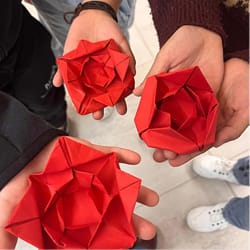There is rather a debate that places the existence of this practice somewhere between continuous research and social experimentation.
I heard about Social Theater for the first time during the pandemic as it is considered a theater art used for “therapeutic purposes.”
In Liguria and elsewhere in Italy and I guess also abroad there are schools and projects dedicated to social theater and this practice is designed and followed by professionals who are experts in theater and in the promotion of well-being that is then proposed to fragile people or communities.
In Social Theater all theatrical paths, performances and initiatives have a cultural and a psychosocial purpose.
Social Theater is considered to be a theatrical experience and a laboratory that involves the users of psychic discomfort on the one hand and the physical one on the other.
It is a technique often used in prisons, community theaters and theaters where actors are political refugees, women victims of violence or youth at risk.
Here in Genoa there are some social theaters but, in particular, there is a famous social theater which is used for the refugees and immigrants arriving to the city (and not only).
Genoa is a port city and, as such, it welcomes new immigrants and refuges all the time.
There are many projects to give housing and financial supports to these people but I have heard that Social Theater is used as a way to integrate them into the society and as a way for them to learn the language and the customs of this region and this country.
It is for this reason that the Social Theater I am referring to uses Ligurian legends and traditional Ligurian characters to introduce our culture to these new foreign arrivals.
For what I learnt about it, Social Theater happens when the making of theater is carried out in a social context with a social and educational objective.
It basically aims at activating the growth of the individual, of the group and of their relationship within the context (environment, relationships, family, work), through the practice of the theater workshop and the creation of a final communicative act (the show) that involves all the participants and an audience.
Social Theater is indeed an interactive theater and I got to participate in a show and I don’t mean attend because Social Theater is an active experience and not a passive performance.
It is hard to draw a line between the actors and the audience in such a show and that is why it is to be considered an inclusive performance.
This form of theater grows spontaneously in uncultivated places and the ‘guides’ (as they prefer to be called) train the participants to develop expression and interaction between people and groups, with particular attention to the social fabric and the needs of the territory.
It is sometimes used in schools, or even in asylums and rehabilitation centers, as a way to educate and bring together those who feel on the margins of society.
In the slow recovery of the post-pandemic, it seems that this technique may again be useful.
When the Ministry of Health published some news on the psychological effects of the quarantine among them were feelings as fear, loss of control and social stigma towards particularly vulnerable subjects: we are therefore talking about the elderly, immigrants, young people and subjects with previous psychological disorders other than those who have experienced the pandemic working in the front line (such as nurses, doctors and health personnel).
In this way social theater could be an important tool for inclusion, participation and social integration that precisely fights against the risk of social exclusion.
PHOTOS BELOW granted by my friend Diego Borra (please see below)
Social Theater photos

































































